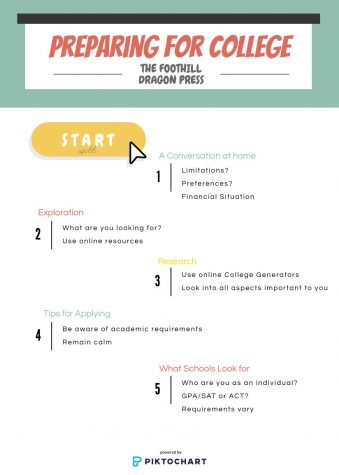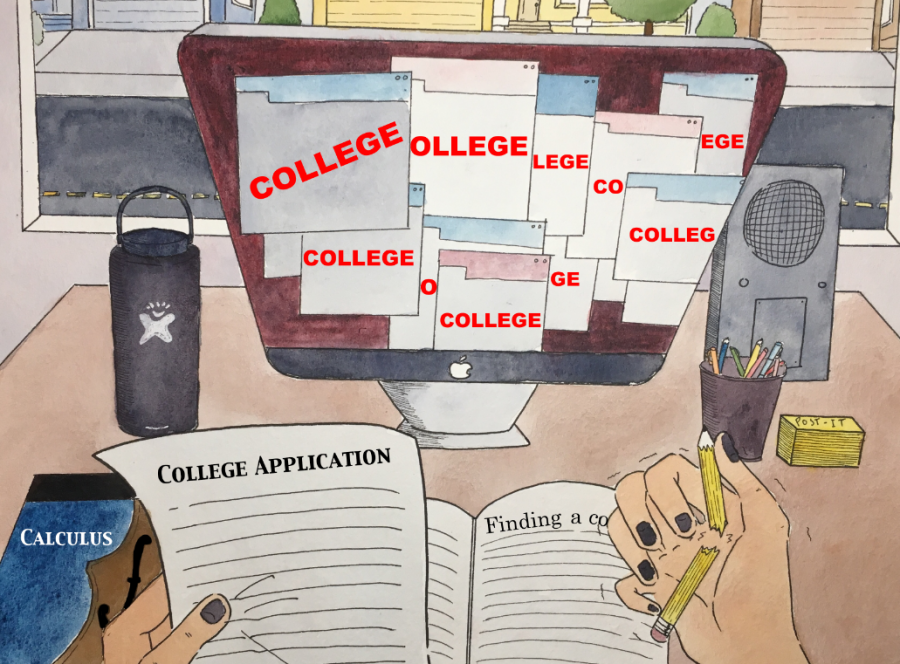College: How to start your expedition
College, in the front of every junior’s mind
June 2, 2019
In middle school, it seemed that four years would last a lifetime. College was a futuristic concept and high school graduation was light years away. Now, it’s as if I went to bed a freshman and woke up a junior.
In the blink of an eye, the time came to start looking at schools, figuring out a major and location and working on college applications. A simple question but a daunting one: community college or a university? One question after another, the room is spinning and I’m on the verge of a nervous breakdown. Nevertheless, with a little guidance and some answers, the whole college process could be a lot less stressful.
Where to start
Juana Vega, one of Foothill’s three counselors, recommends, “first things first is that a conversation has to happen at home.”
A talk with your parents is essential: are there any limitations? Some families will prefer their kids to stay close to home or attend a community college before a university. Sometimes this all depends on your financial situation, especially with student debt.

Where to start on your college journey.
“We always say [money] shouldn’t be the thing that stops you from going to school, but of course cost is important,” Vega said.
Find out what your parents have in mind, then think about what you want. Do you want to stay in the state, or go out of state? What type of demographics are you looking for? Would you prefer a large school, or a smaller one?
The most important thing: explore. You have to research to discover. The counselors recommend californiacolleges.edu as a good website for finding different schools in California. They also suggest using the College Board website, which has a tool that will pair you will different schools across the country based on the information provided.
Research
Thanks to the internet, finding out information on the school of your choice is quick and simple. Search for the school’s online website where you can find admissions data, requirements for entry and register for a campus visit. Other websites, such Peterson’s and Raise Me are great for branching out and introducing what different schools might have to offer. The next “best thing you can do is visit,” Vega remarked.
“You have to almost walk on to that campus to get a feel for, ‘is this me?’ and that’s your indicator, that and talking to students while you’re on the campus,” said Vega.
She’s seen kids plan a road trip with a group of friends or with parents to visit schools and help subsidize the trip together. If you do attend a college tour, talk with students enrolled on campus and don’t be afraid to ask questions! However, not all campus’ are in the exact same location, many of which are across the country. So, virtual tours are available online for prospective students.
Tips for applying
“Every year we come across where students are just not doing their research when applying,” Vega expressed.
Students should be aware of the acceptance requirements and find out the specifics, like admission GPA and SAT scores. Another mistake students make is when they, “apply and don’t look at the tag price behind it, and that’s another mistake,” Vega said.
These are the six #college planning steps you can complete for six different #OpportunityScholarships. PLUS if you complete all six, you’ll be eligible for a $40,000 scholarship. https://t.co/PPLOmv0a0F
— The College Board (@CollegeBoard) October 30, 2018
On top of everything else, not knowing exactly what you want to pursue is perfectly normal.
“It’s okay if you don’t know,” Vega emphasized.
Students will have an opportunity to explore a variety of classes, especially their first two years of their undergraduate degree.
Debbie Freeman, another Foothill counselor, said that “most students at 17 or 18—you’re not going to know what you want to do the rest of your life—and even students that think they know, a majority of them change their majors many times.” One way to discover your passion is by trying different kinds of classes.
Here are a few college application tips to keep in mind when you submit materials. pic.twitter.com/uBijU7iaQD
— ACTStudent (@ACTStudent) October 16, 2018
Vega shared a story about how she recently saw a Foothill alumnus who said he changed his major three times and still finished school with his Bachelor’s Degree in four years. Freeman also mentioned that some classes will count as elective credit, even if you decide to pursue another major.
On the flipside, “you can’t go in there undecided and then all of a sudden decide ‘I want to do engineering,’ it doesn’t work that way,” but if you go in as an engineering major and decide it’s not for you, there’s no problem changing, Vega said.
In most cases, this is provided that you change your major before junior year. As far as financial aid, nothing will change unless you have to stay another year.
If you are struggling with finding a major, Vega said, “dig deep and go with your heart.”
What schools look for most
Ultimately, every school is different, and some look towards one area more than the other. In general, “public schools are going to go mostly by your GPA and your test scores where the private schools will take a more holistic approach look at the student,” Freeman explained.
Private or prestigious schools will look to “see more of who the person is, deeper than just your grades or test scores,” Freeman said.
There is a lot of variation in the whole process: “we see that sometimes it’s like a kiddo with a 3.7 and not maybe the best score got in, but then we get kids with a 4.4 that didn’t get in,” Vega described.
That’s where the essay or application makes a huge difference.
Freeman described how the Freshman Admissions Counselor at Stanford University, “said all the students that apply to Stanford are bright. They’re really outstanding students: they all have a high GPA, they all have high test scores and [Stanford is] looking year to year how to have a well-rounded campus.” Which means they’re looking for kids who are unique and bring something different to their campus.
Massachusetts Institute of Technology “also said that all the students are going to be great at science or math, all have high test scores and GPAs but maybe you did something out of the box,” which is why they accept you, Freeman said.
Schools are not just looking at your grades, but what makes you stand out.















